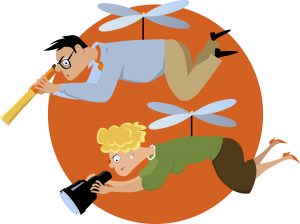By Jamell Andrews
It’s hard to imagine that a parent could take too much interest or responsibility for their child or give them too much attention. Isn’t that a parent’s job and right as the person responsible for bringing them into this world and loves them more than anything? It turns out that you could be walking the fine line from a good parent to a helicopter parent that is doing more harm than good.
What Is a Helicopter Parent?
Helicopter parent is a popular term for someone who over-parents their children. It refers to hovering over your child and shadowing what he or she does, not giving them the room to do things for themselves.
Some examples of this behavior include:
- Doing things for a child that they can and should be doing for themselves, from walking them to school to choosing their high school courses for them
- Fighting their battles for them
- Watching them finish their homework and giving them the answers
- Directing your child’s behavior, such as during playtime
- Always letting your child win
A helicopter parent doesn’t give a child the independence to do things for themselves, including the opportunity to fail and learn from their mistakes. They are overprotective, controlling, and overly worried that their children will get hurt or feel bad. It’s natural as a parent to want to protect your child and keep them out of harm’s way, but going overboard and trying to shield them from all disappointment, taking charge of their actions and decisions, and doing things for them as opposed to offering your help or guidance are all signs of helicopter parenting.
This type of behavior stems from good intentions, but underlying issues with the parent can cause it to spiral to an extreme. It often happens when a parent suffers from anxiety or feels the need to overcompensate because of feeling neglected or unloved by their own parents. In some cases it stems from pressure to be a better parent that comes from other parents or even the media.
The Damaging Effects of Over-Parenting
Researchers have been studying the effects of over-parenting for years and there is a lot of evidence to show that this extreme parenting does have a negative impact on the child, often resulting in the opposite effect of what the parent is trying to do.
Over-parenting has been linked to psychological distress, such as depression and anxiety, in emerging adults, along with lower life satisfaction, perceived stress, and reduced self-acceptance, according to a 2011 study. Other negative effects of helicopter parenting on children include:
- Self-entitlement
- Narcissism
- Poor coping skills
- Lack of proper life skills
Study after study has found that children of helicopter parents have trouble dealing with situations in everyday life and go on to have more difficult lives as a result of overzealous parenting.
How to Avoid Being a Helicopter Parent
Here are a few pointers to help you avoid being a helicopter parent:
- Let them learn from their experiences, including mistakes. As much as you want to protect your child from disappointment, it is often the mistakes we make that help make us stronger and improve our decision-making skills. Let your child experience things for themselves even if they’re at risk of being disappointed or feeling uncomfortable. This gives them the chance to learn and grow from their experiences.
- Stop taking responsibility for your child’s actions. You don’t need to apologize for your child’s behavior or clean up their mistakes—they need to do it themselves. The last thing you want is for your child to grow up actually believing that their mistakes are your fault or anyone else’s but their own.
- Don’t do for them what they can do for themselves. If they’re able to cut their own meat, clean their own room, or choose their own classes, then let them do it. By taking charge and doing things for them, you’re sending the message that you feel they’re not capable, which can lead to low self-esteem. We all take pride in doing things well. Don’t rob them of the chance to feel that sense of pride and accomplishment.
- Know the difference between guidance and shadowing. As a parent, you absolutely should be engaged in your child’s life and ready to offer your help and guidance. There is a difference, though, between doing that and shadowing or hovering. You can help your child with their homework, just don’t give them the answers or do it for them. You can offer advice when your teen starts dating or looking into colleges, but don’t tell them what they should want, how they should feel, or what they should do.
At the end of the day, you want your children to have minds of their own and the life skills they need to have fulfilling lives. Trust that your love and guidance will help them make good choices.
